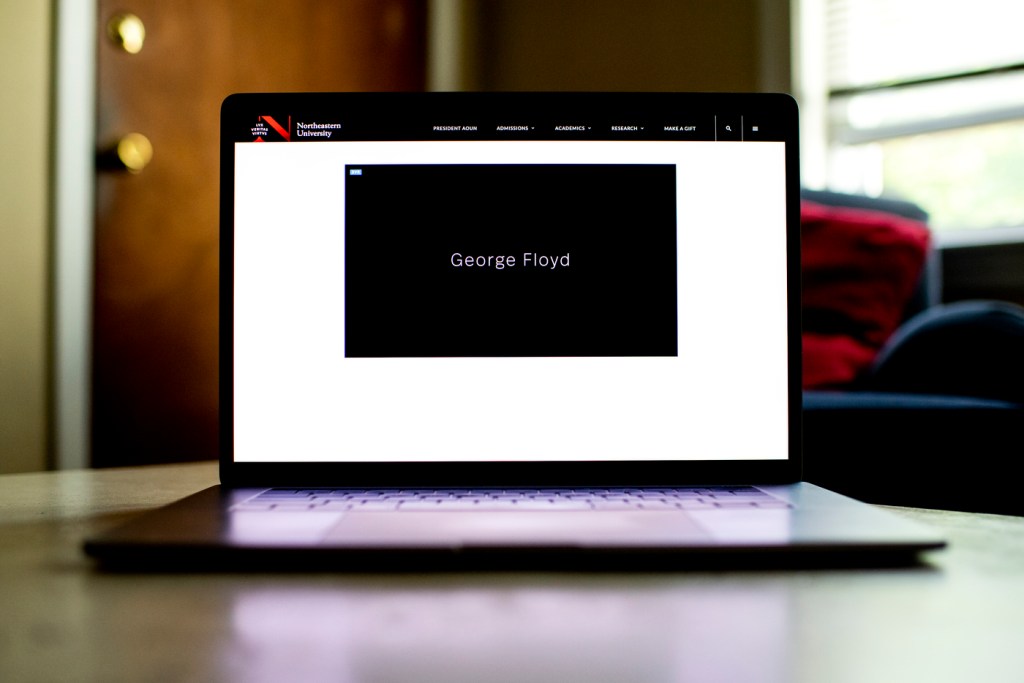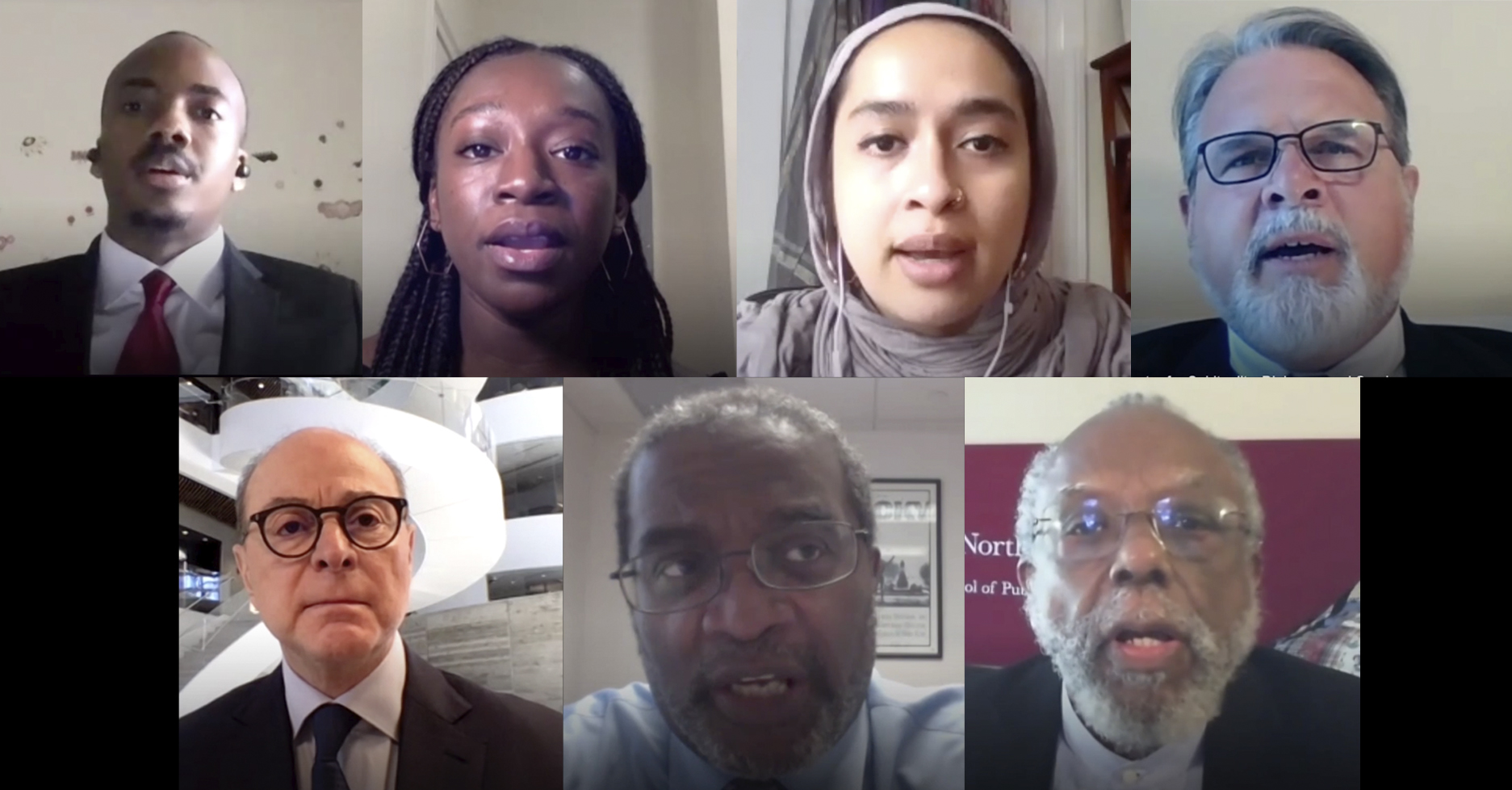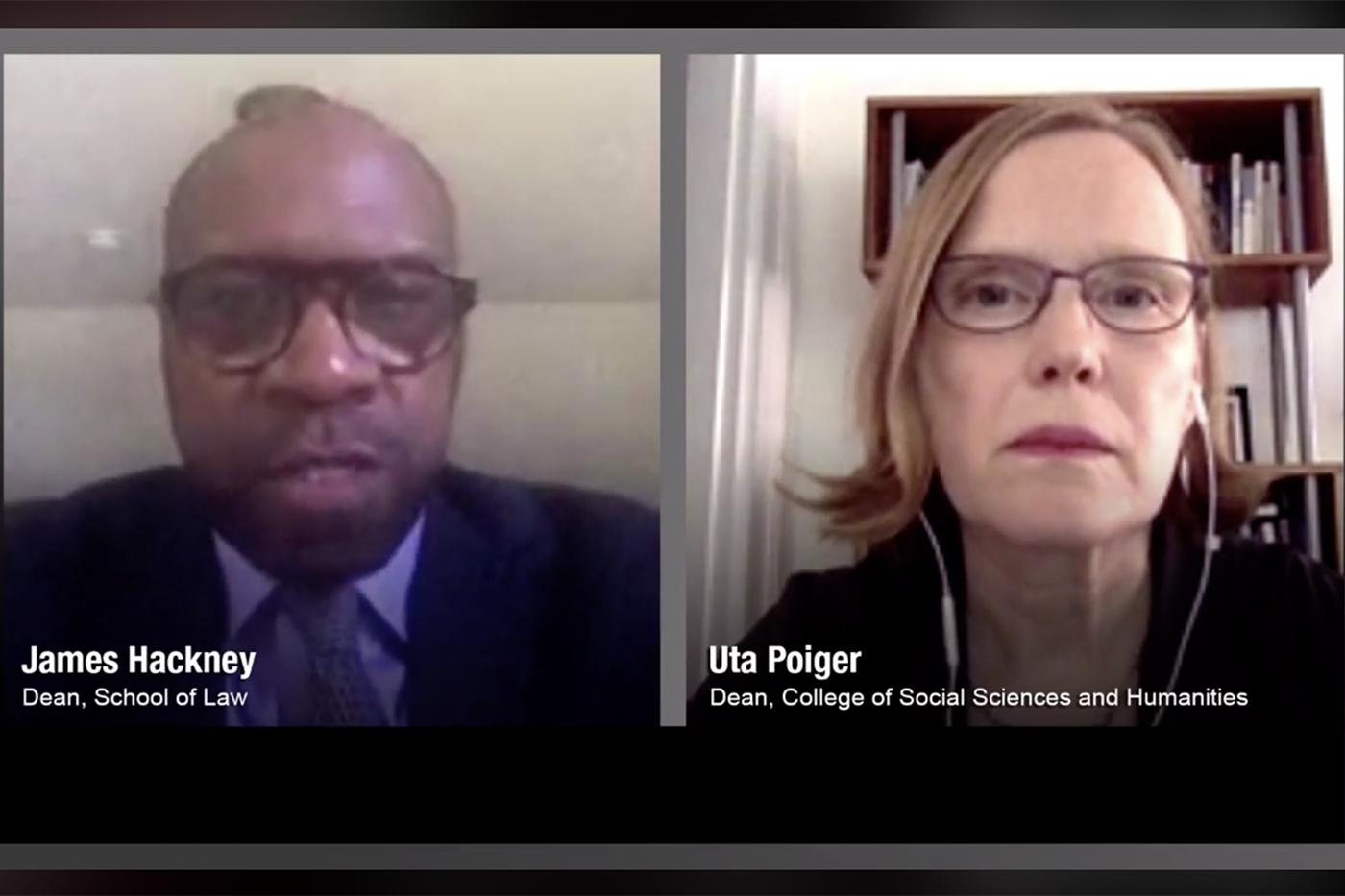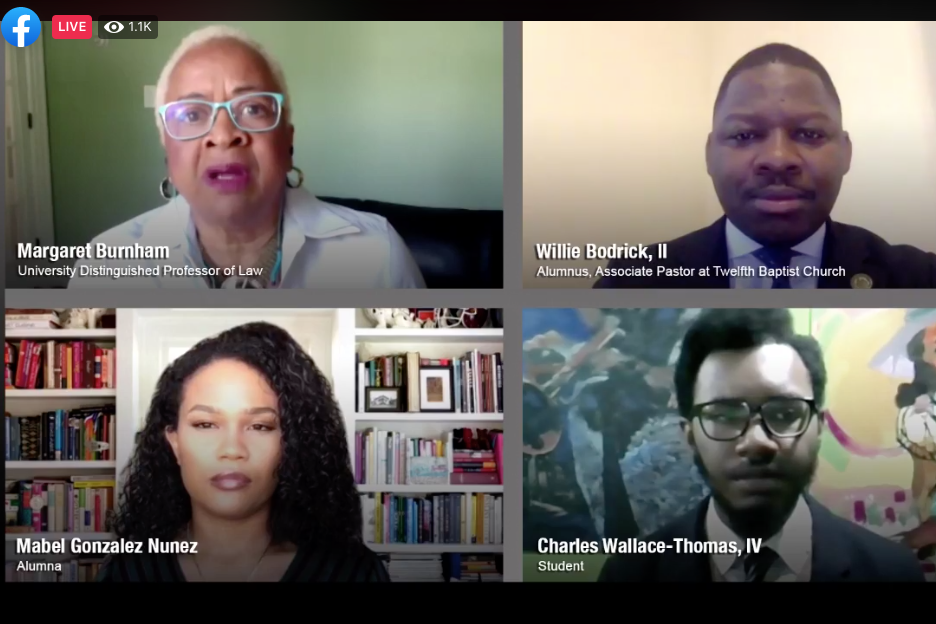‘Let us pledge that our university will take action’

In response to the outcry over recent killings of George Floyd and other Black people by police officers, Northeastern on Monday affirmed its support for the Black Lives Matter movement. A vigil and a roundtable discussion honored the Black people whose lives were taken unjustly and set a course for what must happen next.
Joseph E. Aoun, president of Northeastern, said that the killings of Floyd, Breonna Taylor, Ahmaud Arbery, and Tony McDade have sparked a universal call to action.
“Let me say, on behalf of the Northeastern University community: Black Lives Matter,” Aoun said at a morning vigil to honor this Day for Reflection, Engagement, and Action. “Let us get to work on a path forward. Let us pledge to one another, in the days and weeks ahead, that our university will take action.
“And let us undertake this work together. Lasting change happens when we all take ownership.”

The morning ceremony, An Online Vigil to Remember Black Lives Lost and Confront Injustice, featured efforts by all of the speakers to create widespread understanding and support for Black Lives Matter. It was followed by an afternoon panel discussion about methods for confronting systemic racism and moving forward together that was led by Margaret Burnham, university distinguished professor of law and director of Northeastern’s Civil Rights and Restorative Justice Project.
The two events—held online in accordance with public health guidelines in response to the COVID-19 pandemic—took place two weeks after Floyd was asphyxiated when a Minneapolis police officer kneeled on his neck for 8 minutes 46 seconds. Northeastern suspended all classes and closed administrative and academic offices on all of its campuses in the U.S., Canada, and the U.K.
“Your anguish has moved me,” Aoun said to the speakers who preceded him during the vigil. “I cannot pretend to feel the pain that you feel. I cannot pretend to feel the pain that George Floyd felt. I have not walked in George Floyd’s shoes; I have not lived in your skin. What I can do is acknowledge your pain, seek to understand it, and honor it.”
“The fact is: Racism is a knee on the neck of America’s soul,” Aoun said.


His words were echoed by the co-chairs of the Presidential Council on Diversity and Inclusion, Uta Poiger, dean of the College of Social Sciences and Humanities, and James Hackney, dean of the School of Law.
“Many more of us need to ask: ‘How am I—how are we—part of the problem?’” Poiger said. “Many more of us need to look critically at ourselves and our immediate environments at our own institution, Northeastern. Many more of us need to speak up and out about the dangers we see.”
Said Hackney of the killings of Floyd and others: “These are only the latest acts in a tragic history of racial violence against black and brown bodies. The struggle continues, and we sorely need concrete solutions and actions to solve the problem.”
Burnham and her three panelists offered a variety of reforms in response to the systemic change that they said is needed.
Charles Wallace-Thomas IV, a rising fourth-year Northeastern student in economics and mathematics, called for abolishment of a U.S. prisons system “that is designed to profit from the containment of millions of Black people” in addition to reparations “to make up for the generations of work stolen from our people.”
“We can’t expect to heal without justice. We can’t expect justice without transformation,” Wallace-Thomas said. “We’re running out of time and Black people can’t afford to wait any longer.”
Mabel Gonzalez Nunez, a recent graduate of the D’Amore-McKim School of Business, cited issues in Boston as examples of a national malaise in which Black business people are shut out of growth opportunities, leaving them and their neighborhoods to languish. More leadership positions need to be filled by people of color, she said, but she added that old structures are growing more diverse and changes are coming.
“I really want to highlight the allies that are being created through the Black Lives Matter movement,” said Gonzalez Nunez, who since January has been a program manager at Entrepreneurship for All, a nonprofit organization based in Lowell, Massachusetts, that is committed to creating opportunities for people who are often shut out. “As an Afro-Latina, I feel now it’s even more my responsibility to voice the hardships of the Black community. Not only do you see Latinos, but you see Asian Americans doing that as well. And we’re all coming together to address the Black community and really try to push things forward.”
Reverend Willie Bodrick II, a 2020 graduate of Northeastern’s School of Law and associate pastor at the Twelfth Baptist Church in Roxbury, Massachusetts, laid out a broad agenda that included independent investigations and potential litigation against police officers who treat people unjustly, as well as a ban on the use of rubber bullets and tear gas against peaceful protestors. Bodrick, who has traveled the U.S. to participate in demonstrations after the deaths of Trayvon Martin, Michael Brown, and Eric Garner, said that the goal of the Black Lives Matter movement should be to create “a second Reconstruction.”
“I know all too well that it could have been me, it could have been my wife, it could have been my brothers, it could have been my parents or my friends who found themselves in such a situation,” Bodrick said. “Black people have had to deal with this presumption of guilt that has caused way too many toxic encounters with those who are supposed to protect us.”
Their discussion was preceded by a screening of Murder in Mobile, an award-winning documentary film that tells the forgotten story of a hate crime brought to light seven decades later by a Northeastern law student. Burnham noted that a crucial differentiator between the racial murders of the Jim Crow era and the death of Floyd has been social media, which has prevented the recent killings from being ignored.
“No more business as usual,” said Burnham, who thanked Northeastern for its decade-long support of the Civil Rights and Restorative Justice Project, which investigates acts of racial injustice that took place from 1930 to 1970. “The university has to take action, and it has pledged to do that. We need a new paradigm, we need a new conversation, we need a different conversation—and we need this university to be the leader in what is now a global initiative to confront the history and the legacy of racism.”
The events on Monday signaled a commitment by Northeastern to rise to that challenge. Context for the Day for Reflection, Engagement, and Action was provided at the morning vigil by Karin Firoza, director of the Center for Intercultural Engagement at Northeastern, who broadcast a recitation of the Audre Lorde poem, A Song for Many Movements:
none of us wanted to leave
our bones
on the way to salvation
Maame Amoako, a fifth-year honors student in health sciences who hopes to practice medicine on behalf of underserved communities in the U.S. and her native Ghana, said she has been torn in recent days between commitments to her studies and Black Lives Matter. She said that the COVID-19 pandemic, which is killing Black people at a rate 2.4 times higher than white people—including the mother of Amoako’s best friend—has helped her understand that both goals are necessary.
“This is the reason why I need to become a doctor,” said Amoako, who is president of the Northeastern African Student Organization and a member of the Huntington 100. ”I believe that we will tear down the racial injustices facing our Black community. It will not be easy, but together we can begin to dismantle every system that oppresses.”
The vigil was led by Robert Jose, associate dean of Cultural and Spiritual Life at Northeastern, who noted that the ongoing protests are more racially diverse than he has ever seen.
His sense of hope was affirmed by Ted Landsmark, director of the Dukakis Center for Urban & Regional Policy at Northeastern, who grew up in an era of Black lynchings that compelled him to participate in demonstrations ranging from his hometown of New York City to Selma, Alabama.
Progress on civil rights may be slow, said Landsmark, but pressure must be maintained against “the chilling iceberg of centuries of economic abuse, directed towards black and brown people in America.
“We need to remember that success doesn’t take place immediately,” Landsmark said. “Sometimes the greatest challenge that we face, and the greatest courage that we can show, is with our families and friends who may deny the truths of justice all around us. These injustices didn’t come into being overnight. And they’ve been perpetuated at times through our own complacency.”
Jose noted that the protesters “have a right to be angry and full of rage, but they refuse to let it devolve into bitterness.” Dylan Gates, a rising third-year student in computer engineering and a member of the Ujima Global Leaders Program of the John D. O’Bryant African American Institute and several other student organizations, affirmed the mission to create positive change after the tragic deaths of Floyd and others.
“I will not let the anger within me take control,” Gates said. “Like Booker T. Washington said perfectly, ‘I shall allow no man to belittle my soul by making me hate.’”
The vigil was punctuated by a moment of silence 8 minutes 46 seconds long, equal to the length of time it took for Floyd to be asphyxiated by the police officer. It was accompanied by the scrolling of more than 100 Black people killed by police across a black screen.
“As we work for a just horizon, let us not forget the crushing price the Black community has paid,” Aoun said. “So I say to all of you today: George Floyd’s life mattered. As did all the lives we honored today.
“And, in closing, let me be clear. Here at Northeastern, Black Lives Matter.”
For media inquiries, please contact media@northeastern.edu.






